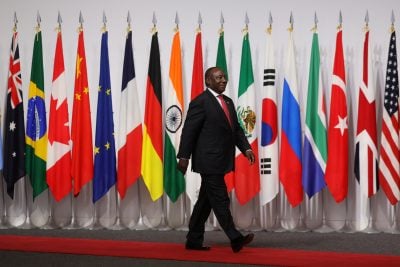In 2021 the London-based Lloyd’s Register Foundation ran a survey that sought to assess how optimistic people around the world are about the potential of artificial intelligence (AI) to improve their lives.
The foundation polled 125,000 individuals across 121 countries and asked whether respondents believed AI would “mostly help” or “mostly harm” people over the next two decades. Arguably the biggest takeaway from the exercise was how starkly the responses varied by region.
In Eastern Asia, just 13% of people thought that AI was mainly a bad idea. Almost 60% of those surveyed answered that the technology would “mostly help”. To different extents, the consensus was the same across Europe, Oceania, and Central Asia.
The four regions most sceptical of AI? Central and Western Africa, Southern Africa, Northern Africa, and Eastern Africa, in that order. Indeed, Eastern Africa was the only region anywhere in the world in which more than half of people surveyed thought that AI technology is likely to be a source of danger and harm. Clear majorities in Tanzania, Kenya, and Uganda were all worried that AI will prove dangerous. The report cited relatively low levels of internet access and less exposure to technological developments as one potential reason that Africans appear to be less positive about the potential of AI.
But there may be another reason – that people are understandably fearful of an emerging technology whose own proponents accept could be a revolutionary force. AI, which has many different applications but essentially works by using complex algorithms to analyse large datasets and make instant decisions, is seen by some as awesome in its potential power.
Promoting fears of a dystopian future
Given this, AI critics often express fears that the technology could ultimately become uncontrollable and far surpass human capacities – heralding a dystopian future of mass job losses and societal collapse.
Sam Altman, the CEO of US pioneer OpenAI, whose technology powers the ChatGPT “chatbot”, hardly helped dispel such concerns when he said – albeit jokingly – that “AI will probably, most likely, lead to the end of the world, but in the meantime, there’ll be great companies.”
Mehdi Sayegh, co-founder of AI Connect Africa, a technology hub in Abidjan, tells African Business that “there remains this idea in some places that AI is evil… people still do not know if AI is secure and if their data is safe.”
“There is also the issue of digital literacy – we lack people who are trained in AI or even understand it,” he adds. This is true as much for businesses as individuals, according to Kennedy Chengeta, an AI entrepreneur in Pretoria. He says that many African business leaders “are still not sure what value the technology offers their business and how they can make profits from using it”.
While Chengeta notes that the continent’s banks are a notable exception to this trend – First National Bank (FNB) in South Africa has already implemented AI solutions to enhance fraud detection, for example – he is concerned that, more broadly, there is a lack of understanding.
“There is a gap between businesses and technology companies,” he says. “We need greater interaction between the industries so businesspeople can better realise the potential of AI.”
A transformative impact
Amal El Fallah Seghrouchni, executive president of the International Centre of Artificial Intelligence of Morocco in Rabat, agrees that AI has an image problem in Africa. She is leading an “AI Movement” that seeks to deliver a more positive message about AI – to emphasise how the technology can be transformative for Africa and for standards of living across the continent.
“We need to show that we can really solve fundamental problems,” she says.
Seghrouchni notes that Africa has already had a taste of how the technology can drive up standards in critical industries. In agriculture, AI-powered tools have been used in Africa to analyse farm conditions such as rainfall and soil health and deliver actionable insights in real-time, allowing farmers to make the appropriate changes and drive up crop yields.
Venkataramani Srivathsan, managing director for Africa and the Middle East at global agri-business Olam, previously told African Business that “with AI’s help, applying the right inputs, pesticides, or treatments at the right time can determine the success or failure of a harvest … this technology can transform not just individual farms, but also the sector on a previously unimaginable scale.”
In healthcare, AI has been used to help clinicians and policymakers track the spread of infectious diseases. A recent project in Mozambique saw healthcare workers use portable X-ray machines that were connected to an AI program to analyse the outbreak of tuberculosis in a high-security prison. Affected prisoners were identified and diagnosed within minutes.
Hope for healthcare help
Alexander Tsado, co-founder of the Johannesburg-based activist group Alliance4ai, notes that prescriptive AI tools – which use algorithms and data to recommend specific actions in any given situation – could prove particularly valuable in healthcare settings.
“Prescriptive AI can help increase access to basic healthcare in villages,” he says.
“Today, the public [especially in remote rural areas] tend to have little access to doctors as none are close by. People have to use their life savings to travel further or to go to cities for answers to very simple questions – questions that you should be able to receive an answer to by sending a text message to an AI model.”
Such technological solutions could prove vital to a continent with a chronic lack of doctors and medical professionals. Nigeria, for example, has one doctor for every 5,000 patients, while the average in developed markets is one doctor for every 254 people – with Africa often struggling to retain professionals who are lured by the higher salaries available overseas. AI tools could help plug this gap by offering individuals much quicker and cheaper ways to access basic medical information.
“We still have a lot of people die in Africa from diseases that are not that complicated,” Seghrouchni says. She believes that AI tools providing essential facts and advice could drastically reduce the number of fatalities caused by conditions such as malaria, tuberculosis, and diarrheal diseases – illnesses that are major killers in Africa but are usually manageable with even rudimentary healthcare provisions.
Tsado thinks that banking is another crucial sector that is ripe for AI-related innovation in Africa. In particular, he believes that the technology could prove vital in allowing small businesses to access the capital required to grow their operations – capital which, at the moment, they are often denied owing to a lack of collateral.
A study conducted by the investment group Investisseurs et Partenaires found that 40% of small and medium enterprises (SMEs) in Africa identified “accessing finance” as the main obstacle to higher growth. The current funding gap is estimated to be more than $140bn. However, AI solutions might provide an answer.
“Most businesses do not have access to loans from banks – and that is because a lot of loans are based on collateral, and most people do not have a big house to collateralise,” Tsado tells African Business.
“But with AI, you can understand a person’s spending partners and use that information to provide loans that will be transformational for the economy. Africa needs to spend about $100bn every year on infrastructure to reach its goals. AI could be the way to get there.”
A dearth of funding and talent
While the potential of AI solutions on the continent certainly appears to be significant, there is a major issue that could prove an obstacle to the industry’s growth – funding. Last year, total venture capital funding in Africa stood at $3.5bn, representing a 46% drop from 2022. While this largely mirrored global trends, with funding drying up amid a more challenging macroeconomic environment, Africa has a tougher task in attracting investment in its AI space given the extent to which resources are concentrated in more developed markets. 60% of top-tier AI researchers are in the US alone, which has seen almost $250bn in private funding.
How can Africa attract some of this cash? Tsado thinks that Africa offers “huge opportunities” to venture capital funds and foreign investors. In particular, he believes that AI solutions in Africa have the potential to be much more socially and economically “transformational” than in more developed markets, something which could encourage greater investment flows.
“I was talking to an investor recently, and the fellow was talking about Singapore, and how AI is trying to solve problems such as “how do I receive my food in 30 minutes rather than an hour?” That is the kind of problem that AI is being used for in these markets,” he says.
“But in Africa, AI is being deployed to identify diseases on crops and plants, which is transformational for farmers. We are seeing similarly important things in the health or financial space. AI in Africa can be transformational for hundreds of millions of people – that is a big thing to invest in.”
Seghrouchni agrees that Africa is home to “specific problems” whose importance could be an attraction to impact investors looking to help solve the big issues, as well as secure returns. However, she is also optimistic that “the AI solutions can then be generalised for export to other continents.”
“Africa can provide solutions that are very original and disruptive,” she says.
While more venture capital funding in Africa’s AI start-ups would certainly be welcome – and Tsado says that investors are starting to recognise the opportunities available in African markets – he also argues that it is important for the industry to work out how this cash can be used more efficiently.
Indeed, because African start-ups tend not to have their own AI-related infrastructure, Tsado says they mainly have to rely on cloud suppliers such as Amazon Web Services (AWS). These allow companies to access the required technology and build and scale AI applications without having the advanced in-house computing that would otherwise be needed. While the costs are relatively low by US or European standards, Tsado notes that the costs are significantly higher in Africa. This means that the continent’s start-ups, which are usually working on limited budgets in any case, are forced to spend a large proportion of their money just to access the technology – imposing a huge cost before they even start building their application, and reducing the amount of capital they can invest in human capital or growing their business.
“The cost of AWS, for example, continues to be extremely expensive. I was just talking to one of our experts in Kenya, and he said that even to play with a Gemini AI model [Google’s AI service] in Kenya, it could cost you $1,000 a month,” he explains.
“To hire a pretty decent engineer would cost you about $2,000 a month. So, it took him half the price of a full engineer just to do some R&D on one AI programme.” “Start-ups are receiving VC funding, but then they’re turning around and spending 50-80% of it on AWS because the cost structure does not make any sense. That is extremely bad. I think that we are only getting less than 10% of the innovation power of Africa because of a lack of access [to such technologies],” Tsado tells African Business.
“We’re working with weak foundations. We need to get to a place where we have several computing clusters across Africa – that could dramatically reduce the costs for the start-ups so they can truly innovate.”
Data deficit
Another area Africa will need to get right, if the continent is to unleash the full potential of AI, is data. This is particularly important because AI tools are “trained” to make decisions based on datasets.
But information sourced from African countries and from individuals on the continent currently makes up a tiny proportion of the data being used by AI models. As a result, the systems are often not able to work properly or fairly in a specifically African context. One domain in which this has become especially apparent is that of social media, where the world’s tech giants have started to use AI to filter out illegal or disturbing content. But a lack of local language capabilities and other relevant data means that the tools are not as efficient in Africa as elsewhere. African citizens are therefore more at risk of harmful content than should be the case.
Similar trends have emerged in other fields of AI, too. Language models using AI have been found to be delivering potentially harmful medical information to black people, for example, while inaccuracies in facial recognition technology have also resulted in wrongful arrests. Both cases stem from a lack of data related to Africans or diaspora populations.
Vukosi Marivate, chair of data science at the University of Pretoria, believes that “this problem cannot be solved overnight” but thinks “that it might require some regulation to set minimum standards” that oblige tech firms to ensure their AI is working with the appropriate data.
“There was a request from the European Union to X [formerly Twitter] that forced the platform to disclose how their content moderation was working,” Marivate explains.
“It was very interesting to see that for some European languages – some of which were spoken by hundreds of thousands or millions of people – they had just one person familiar with the language working on content moderation. I have a feeling that, if you were to do the same thing in Latin America or Africa for more indigenous languages, the situation would be even worse.”
Tsado, who previously worked at Nvidia but left after raising concerns with its CEO about AI’s potentially harmful effects on minority groups, says that the answer to filling AI’s “blind spots” is to encourage more people in Africa to get involved with the technology – and thereby provide the data that would help create better outcomes for Africans.
“Engineers and scientists are not building AI tools and saying, “I’m going to use this to cause harm.” They are thinking, “oh my goodness, it is going to be very expensive to find this data and build this model – so I am just going to do it as easily as I can, push it out, and try to reap the benefits. “They try to find the data for free online, or they get stuff together by themselves, meaning the data ends up being only from groups similar to themselves,” Tsado says.
“If AI has been built solely from the US, and solely from the most elite institutions in the US, there are going to be huge blind spots. The tools they make will not take into account people who are not in those environments,” he adds. “When it comes to Africa, my message has always been that if you are worrying about the dangers of AI, that does not mean you should run away from it – that is the exact reason you should jump right into it and become builders.” “That is the way to have influence over the way AI is built – you can provide your inputs that would help reduce harm.”
A catalyst for education and jobs
While there are plenty of reasons to be optimistic about AI and the potential benefits it could bring to Africa, even its strongest proponents recognise that its introduction is likely to cause significant social and economic change. After all, citizens’ fears about job losses are not entirely unfounded. The African Development Bank has projected that, partly because of technological advancements, 100m young people on the continent will be unable to find work by 2030.
Seghrouchni thinks that governments across Africa should be focusing on “upskilling” to ensure these concerns are addressed.
“The AI industry needs to be as inclusive as possible,” she says. “We have to invest in education to upskill the population.”
Seghrouchni thinks that AI will be deployed through useful tools that complement human workers and improve outcomes, rather than eliminating the need for human labourers altogether. Tsado is of a similar view and argues that, should the technology be managed properly, the AI age could be a job creator rather than destroyer.
However, as Seghrouchni suggests, education is clearly required to ensure that workers are well-positioned to capitalise on the opportunities presented by AI.
“AI tools are going to create a lot more jobs. They are going to create a lot more access to spaces that were previously open only to experts,” Tsado says. “But people need to be open to change. In an ideal world, every employee would spend an hour every day learning about the new tools. I tell people, AI is not going to take your job, but someone who knows AI will take your job.”
Should Africa manage to address or minimise the risks associated with AI, the rewards could be great. The most optimistic vision for AI in Africa is one in which the continent uses digital technologies to “leapfrog” into an era of stronger and more inclusive economic growth.
That future is possible but far from inevitable. Africans’ legitimate fears about the onset of an AI revolution will only be addressed if governments and businesses succeed in demonstrating how the technology can be deployed in a positive way.
Seghrouchni thinks this is critical if Africa is to unlock the potential AI offers.
“We are in a situation where people are very afraid of AI,” she says. “We have to deliver a very positive message about AI because, without the support of the African people, the industry will not be able to develop.”

 Sign in with Google
Sign in with Google 



